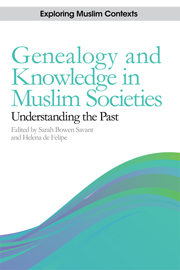Book contents
- Frontmatter
- Contents
- List of Figures and Tables
- Introduction
- Part One The Generation of Genealogical Knowledge
- 1 Keeping the Prophet's Family Alive: Profile of a Genealogical Discipline
- 2 Motives and Techniques of Genealogical Forgery in Pre-modern Muslim Societies
- 3 The Genealogy of Power and the Power of Genealogy in Morocco: History, Imaginary and Politics
- Part Two Empowering Political and Religious Elites
- Part Three Genealogy as a Source for Writing History
- About the Contributors
- Index
2 - Motives and Techniques of Genealogical Forgery in Pre-modern Muslim Societies
from Part One - The Generation of Genealogical Knowledge
Published online by Cambridge University Press: 05 September 2014
- Frontmatter
- Contents
- List of Figures and Tables
- Introduction
- Part One The Generation of Genealogical Knowledge
- 1 Keeping the Prophet's Family Alive: Profile of a Genealogical Discipline
- 2 Motives and Techniques of Genealogical Forgery in Pre-modern Muslim Societies
- 3 The Genealogy of Power and the Power of Genealogy in Morocco: History, Imaginary and Politics
- Part Two Empowering Political and Religious Elites
- Part Three Genealogy as a Source for Writing History
- About the Contributors
- Index
Summary
In a society that attributes great significance to descent, genealogical forgeries will abound. Such phenomena were ubiquitous in pre-modern Muslim societies, where the dominant ideology considered descent to be a paramount factor in deciding a person's character, prestige, status and political legitimacy, despite the contrary teachings of the Qur'an and hadith.
In an important recent article, Ella Landau-Tasseron analyses the issue of falsifying descent. Her focus, however, is on adoption and the acknowledgement of paternity, not on forged genealogies, which, as she notes, tend to be glued to ancestors “already dead and buried”. She hardly treats such brazen forgeries and the techniques of producing them, largely confining herself to cases of disputable paternity. By contrast, this chapter's goal is to explore the practical methods of manufacturing false genealogies. I will discuss descent, not paternity, and my concern here is with down-to-earth issues: techniques and tricks, not theoretical dilemmas. As this chapter will illustrate, passing for someone else is not easy, even if sources tend to mention such cases as if they were common. Before turning to this subject, however, it will be necessary to explore another problem, namely the motives behind genealogical forgeries. Given the difficulties described below of having a forged genealogy accepted, there is certainly the need to explain why so many people were willing to undertake the considerable risk and trouble involved. As I argue in the following section, the potential spoils were worth the effort.
- Type
- Chapter
- Information
- Genealogy and Knowledge in Muslim SocietiesUnderstanding the Past, pp. 24 - 36Publisher: Edinburgh University PressPrint publication year: 2014

